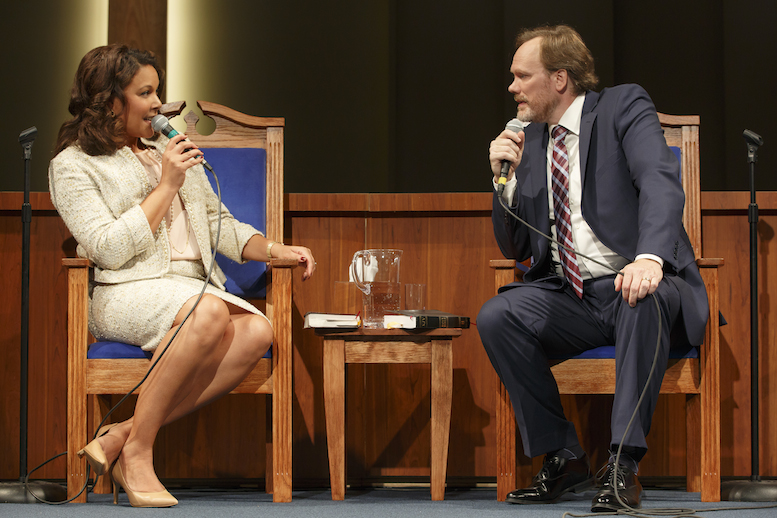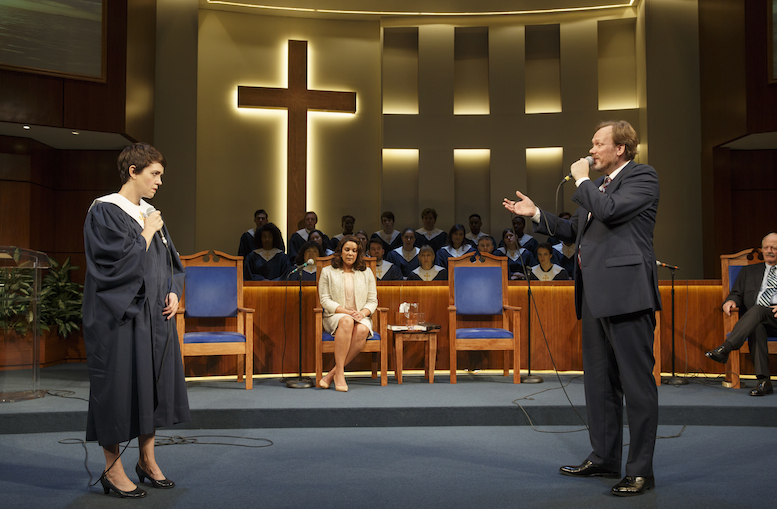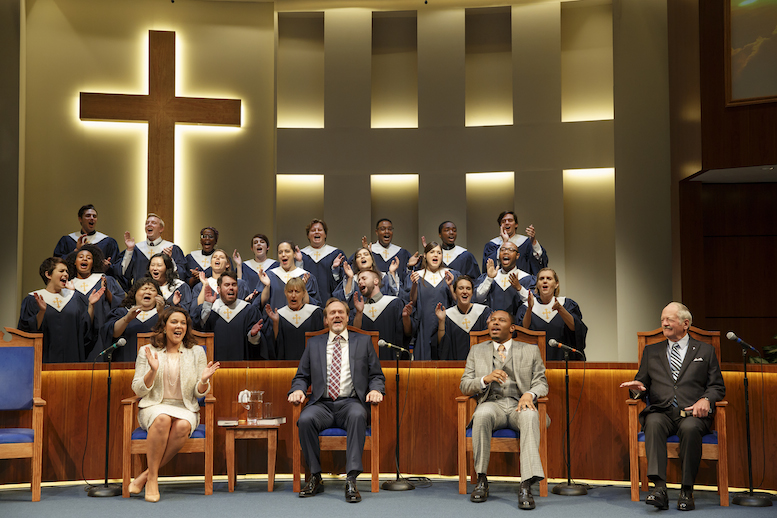In his play “The Christians,” Lucas Hnath — a Civilians Commissioned Playwright — draws from personal experience and stories about embattled religious leaders to craft a portrait of a church community contending with a doctrinal crisis. Hnath spoke to Steve Cosson, Artistic Director of the Civilians, about mining religion for performance and ensuring that the finished product eschews satire. “The Christians” played August 28—October 25 at Playwrights Horizons in New York City.
STEVE COSSON: I would love to talk to you a bit about the process behind creating “The Christians,” both the writing of it and the production. How much is the play connected to the incident that happened with—
LUCAS HNATH: Carlton Pearson?
STEVE: Is that his name?
LUCAS: Well that’s the one that people tend to ask about, if they ask. There was a This American Life episode about him, which is why I think a lot of people know who he is. The play isn’t based on that at all, although Pearson was part of the research I did. But there were a bunch of others that were also equally part of that research, and the things that resemble Pearson had actually happened to a lot of people. These church schisms tend to kind of go down in very similar ways. In fact, even like a week ago, I had stopped by the theater, and a pastor and his wife stopped me to say, “Oh the same thing happened to us. It wasn’t about the existence of hell, but we just had a schism in our church, and this is exactly how it went.” So there seems to be a pattern in how these schisms play out.
STEVE: So if it wasn’t him, what was the impetus for the play? Where did it come from?
LUCAS: I’d been wanting to write a play that took place in a church for a really, really long time. The image that I had in my head was of the stage at a church, and the line of associate pastors and pastor, which almost feels like a political event. That image had been in my head since at least 2000. And I knew that I wanted to write a play about a very large church, because as a child, I went to a very large church. When I was quite young, we went to a church that had grown very quickly, and actually a little too quickly, and the church went into significant debt. So I knew that that was part of the story.
STEVE: Was it an evangelical church?
“When you have a couple of very strongly held beliefs, or people who are absolutists coming together in a play, it becomes a testing ground for ideas.”
LUCAS: Yeah, it was an Assemblies of God church. And the dilemma that I would often think about and even talk to friends about when I would say that I wanted to write this play — I think especially when you imagine doing a play about a church in New York — there’s a real risk of the Christians on stage feeling quite othered. Sort of like these odd specimens, those nutty people who believe what they believe. And I’d been trying to figure out for a long time how to not let the play fall into that, knowing that there’d be such a strong momentum for the audience to read the play that way. And then I had the idea that, if the drama is actually about not, “Do you believe in Christianity or not,” but rather a doctrinal controversy within the Christian faith — if all of the conflict centers on that — in some ways it actually puts you inside the belief as an audience member more than it lets you sit outside of it. Not that the agnostics or atheists convert when they watch the play, but that’s where the stakes are. That’s the tennis match you’re watching. And so I started researching doctrinal controversies, and there are plenty, but the thing about the question of the existence of hell is that it seemed even more timeless than a lot of the other doctrinal controversies. It seemed like that has the potential not to be associated with a particular political movement. It seemed like the most endurable of the controversies.
STEVE: That’s very interesting. I wonder if you’ve had a lot of conversations with audiences who’ve seen the show at any productions you’ve been involved in?
LUCAS: The two that I’ve been around for are Actors Theater of Louisville and Playwrights Horizons. I don’t go out of my way to have conversations with audience members. I tend to actually hide from them. People say weird things to you, but people nonetheless seek me out. I’m sure there are some people who react very strongly against the whole premise of the play and probably even have this resolute attitude that this is a whole conversation that applies not at all to me, and therefore I’m not interested. I am aware that that response exists. The reactions that I’m frankly more interested in are people who would call themselves agnostic or atheist. My interest is in whether or not the play creates a kind of understanding or empathy of the stakes behind these particular Christian beliefs. And a good bit of the response that I’ve gotten indicates that it does create that kind of understanding. I hear a lot of people come up to me and say, “I’m an atheist, but…” And then they’ll talk about the thing that they appreciated about the play, or that they were really moved by it. Or I’ve heard some people say, “I don’t believe in god, but if I were to, I would be very interested in this church.”
STEVE: What interested you, as a writer, to want to have audience members identify with characters who are inside a big evangelical church?
LUCAS: I feel like I was noticing that, especially within the theater, a good bit of the material that discussed religion — specifically Christianity — did so satirically. There are obviously exceptions — and your play, “This Beautiful City,” being one of them — that do not set out to do that. But it still seemed to be a massive gap in contemporary theatrical literature. Any time I notice a gap — something that’s not being talked about or said or noticed — then I want to rush in and make something for that barren space.
STEVE: The vacuum beckons you.
LUCAS: Yes, the vacuum beckons me. I like that better. And I’ve even noticed on shows like “The Daily Show” that, when a controversy came up that had something to do with faith, the central argument in the joke seemed to ignore a basic understanding of what a Christian might feel is at stake — I’ll go further now and say that even a fundamentalist feels is at stake in a particular belief. And one of those issues is, in fact, the risk of eternal damnation. When you have that in place… those stakes can create a kind of rigidity. That’s an important component of the conversation, and you can’t have a dialogue without understanding that.

STEVE: I’m certainly compelled by characters that I don’t immediately understand and that have experiences or ways of being in the world that are different than my own. In the case of your characters, who believe in eternal damnation, if they go down the wrong path, the consequences go on beyond the end of the play… Fundamentalists are compelling characters, because they live in an absolute world. And at the same time, it’s such great material for theater, because part of the problem of fundamentalism is that it can’t actually succeed in the world. That kind of absolutist belief wants to keep moving toward greater absolutism.
LUCAS: I have a tendency to be really interested in writing plays about absolutists. It probably also has something to do with my love of the Greeks. But even the pastor in the play, he is not a fundamentalist. He is proposing a gospel of “radical grace,” but he’s also quite absolute in it. And when you have a couple of very strongly held beliefs, or people who are absolutists coming together in a play, it becomes a testing ground for ideas. The conflict becomes a way of thinking about theories about how the world works and finding the holes in those theories. And that’s the thing I like doing in plays. I like plays that are these dialectical arrangements, and I like a theater that proposes theories about how the world works and then tests them through events or dramatic action or arguments. You can see how those ideas change over the course of the play.
STEVE: Yes, I think your play does that. And I’m interested in how what you’re doing — taking on evangelical Christians in a non-satirical, straightforward way — is ultimately bumping up against a theater world that doesn’t want to spend time with those people.
LUCAS: Well, and a lot of people who are outcasts from that world, too. I think it’s possible that there’s a decent percentage of our theater-going audience that feels not only that they’re not part of that world, but that they are rejected by it. So they come into the play with a good bit of armor, and you can hear it in the first 10 minutes of the production. You can hear that they’re very eager to latch onto any line as a laugh line. And there’ll be lines that are just not funny. They’re eagerly looking for the comedy. And the actors’ task, and the thing that our cast is by now really expert at, is figuring out how to calibrate the audience… And it’s interesting, sometimes the audience will go a little sour, and I’m not sure what makes the difference between an audience that does and doesn’t. And that’s the rarity, that that happens, but I have seen it happen.
STEVE: I wanted to ask you about that. The actors seem so completely in control of the play and their material, and I imagine that there is something specific to the subject matter, where you would really need a cast as capable as the one you have. I think certainly the cast that we had for “This Beautiful City,” especially since they were all people who had been in Colorado as a company, were able to combine their talents and really pull an audience into it. But it is very tricky work. We had a very tricky time when we did it in Louisville, where the evangelical presence is so much stronger, and the audience was radically segmented at every performance. There’d be a group of people laughing way too much, and then a group of people you could feel were going into a stony silence, because they couldn’t understand why the other people were laughing and were building up resentment toward them. And then all the different factions in the middle. And the people on stage have to somehow wrangle all that into a coherent experience.
LUCAS: One of the things that ended up having to happen in the writing process is that the language — the “church language” of the play — is actually adjusted. I wrote the first pages of the play during a week-long workshop that I held at New Dramatists, where my request was to have three microphones and five actors. And I had about ten pages of scraps. I went in and showed the actors video after video of preachers preaching, and I asked them to keep lists of everything that the preachers did that was what they would expect a preacher to do, everything they did that upended their expectations, and everything that the preachers did that made them cringe or not trust the person. We collected all of this data, and it influenced how I wrote the play, especially these cringe moments — the moments where the actors watching the preachers went, “I don’t buy it. Oh, you’re full of it.” And I noticed that any time that a preacher used militaristic language, that would make the actors cringe. The goal became to write the play in a language that did not use those cringe moments. And so the language of the play is even a little bit adjusted to give the audience members who might have an inclination to be antagonistic towards these characters a little less ammunition. Then there’s the moment where, in the opening sermon, Pastor Paul talks about sitting on the toilet. And that’s in there, in part, because it’s not what you would expect to hear a preacher say at all. And the language of the play is actually a little more academic. If you look at Pastor Paul’s language as things move forward, he actually talks a lot more like an English professor than he does a pastor. And that’s very intentional… Little adjustments like that defanged the potential response of audience members who weren’t going to have it.
STEVE: I feel very manipulated now. So sneaky.
LUCAS: There were a lot of very careful, careful conversations about every element. The music, we made a choice that it couldn’t be the Christian rock, because that would give people who wanted to read it as a satire too much reason to go there. And so it had to be gospel, which is sort of accepted in both the church world and the secular world.
STEVE: Yes, we’re comfortable with gospel. We don’t like your praise rock.
LUCAS: I mean, the praise rock is fascinating. It’s a real thing. You guys were dealing with it in “This Beautiful City.”
STEVE: Tell me about it. I’ve spent hours and hours of my life listening to it. In the rehearsal process, I imagine that Les (Waters, who directed “The Christians”) and the actors purposefully shaped moments and behavior to achieve the same effect you were going for in the writing?

LUCAS: Absolutely yes. That conversation really spilled directly into design meetings, and straight from there into rehearsal. We would consider even how much the actors could clap along with the choir at the beginning, and how happy they were able to be. And if they were to sing, how would they sing? How much would they expressively sing versus more mutedly? Or would they actually not sing along? All of that’s carefully calibrated, too, so as not to make the audience feel like, “Oh those people are up on the stage now. Look at them doing their little Christian thing.” And the other thing that sort of affects the staging of it is that I have a very particular aesthetic of how the staging wants to work with respect to the way that I use language. And this play is particularly dense. There are giant sections of text, and there’s an aesthetic of stillness that Les and I encouraged quite a bit. We break it here and there, but it wanted to be very still so that you have to listen to the language. So that you couldn’t check out, so you wouldn’t just receive it as churchy and not think. The microphones do help with that, as well, because it gives you the freedom to emphasize words you would not normally emphasize in naturalistic speech. It can be more musical. The other thing that the microphones do is that they reveal a lot of intention. You can see a decision to speak well before it happens, when a person lifts the mic. Speaking into a mic on a stand is very different from choosing to take it out of the stand and walk over and speak. There’s a lot of action that’s happening just in the use of the mics.
STEVE: The mic acting was amazing. Back in the Civilians’ early days, when we did “Gone Missing” 5,000 times, we had mics with cables because that’s what we could afford. And then we stuck with them for a while, and we learned that the mic cable is a major character in any play that it gets involved with. And your cast was full of mic cable masters. On top of that, Les is a master with language who also really understands stillness. He did an extraordinary job with the production. Watching it and taking it all in was effortless when I saw it, which I think speaks to that craft and the writing and the acting and the directing and the design.
LUCAS: It’s very difficult for me to just write words. I don’t know how to write a play if I can’t picture how movement works in it, and how set works, and how lighting works, and how sound design works. I have no idea what to put on the page, unless I can picture all those other things. I think that’s a little bit of how that ends up happening.
Authors
-

Steve Cosson is the founding Artistic Director of the Civilians. He is a writer and freelance director, directing new plays, musicals and classics. Recent credits include "The Belle of Amherst" starring Joely Richardson, the Civilians' "The Great Immensity" at the Public Theater, and Anne Washburn's "Mr. Burns" at Playwrights Horizons. Steve won an Obie in 2004 for the work of the Civilians. He has been a Fulbright Scholar in Colombia, a MacDowell Fellow, Resident Director at New Dramatists, and he has twice participated in the Sundance Theatre Lab. His plays have been published by Oberon Books in the UK, Dramatists Play Service, and Playscripts Inc. in an anthology. He holds an MFA in directing from UC San Diego and a BA from Dartmouth College.
View all posts -

Lucas Hnath’s plays include “The Christians” (Humana Festival, 2014; Playwrights Horizons, 2015); “A Public Reading of an Unproduced Screenplay About the Death of Walt Disney” (Soho Rep, 2013); “Red Speedo” (Studio Theatre, 2013); “nightnight” (Humana Festival, 2013); “Isaac’s Eye” (Ensemble Studio Theatre, 2013); ”Death Tax” (Humana Festival 2012; Royal Court Theatre, 2013). Hnath’s work is published by Dramatists Play Service and Overlook Press. He has been a resident playwright at New Dramatists since 2011 and is a member of Ensemble Studio Theatre. He is the recipient of the 2015 Kesselring Prize, a 2015 Guggenheim Fellowship, a 2015 Whiting Award, the 2012 Whitfield Cook Award and two Steinberg/ATCA New Play Award Citations. He is also a recipient of commissions from the Actors Theatre of Louisville, the Civilians, EST/Sloan Project, New York University’s Graduate Acting Program, Playwrights Horizons, Royal Court Theatre and South Coast Repertory. In 2016 his play “Hillary and Clinton” will premiere in Chicago at Victory Gardens, and “Red Speedo” will have its New York premiere at New York Theatre Workshop.
View all posts









